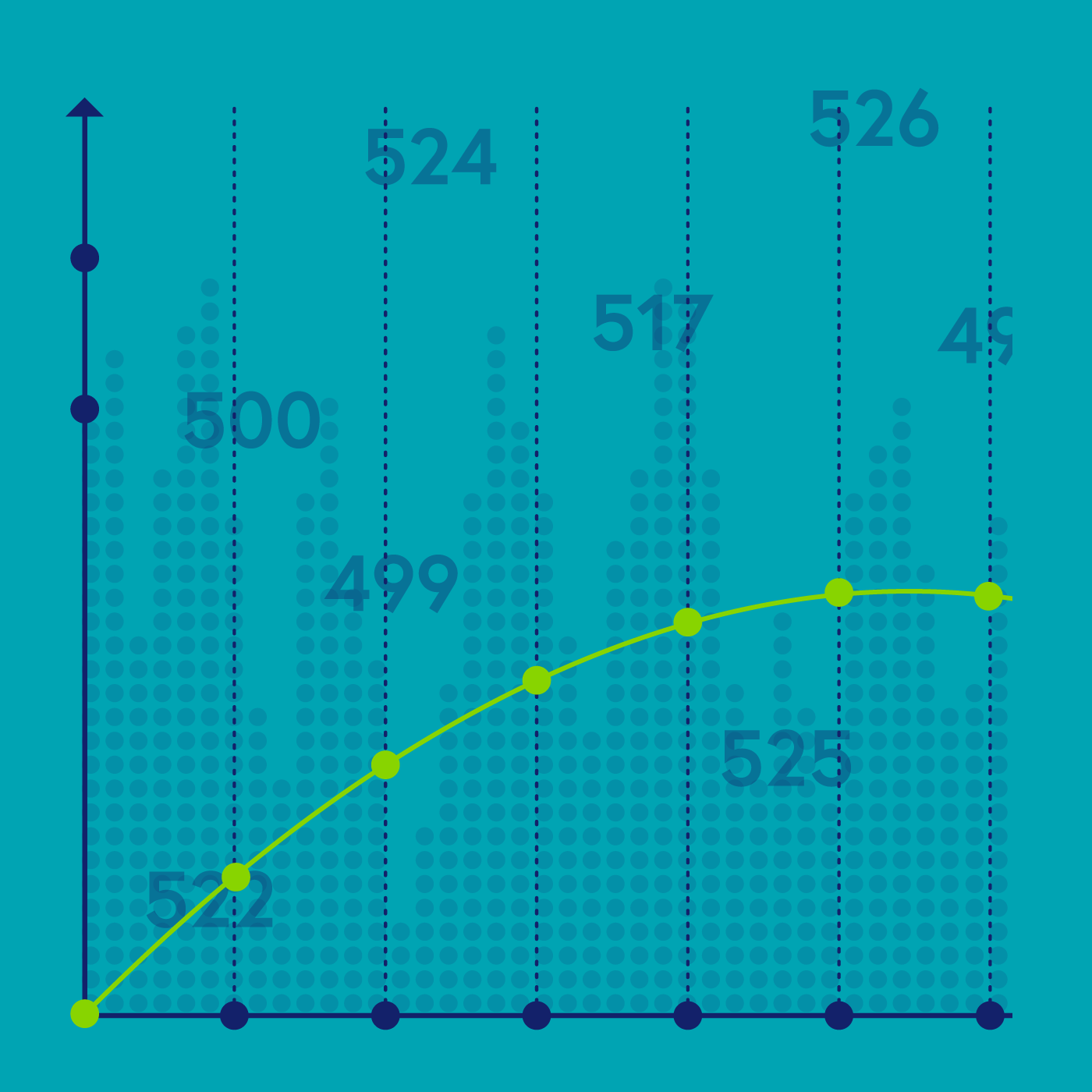If you plan on attending medical school, get ready for a lot of studying. One of the most essential parts of the medical school admissions process is the Medical College Admission Test (MCAT), a standardized exam that takes months of studying and a whopping seven hours and 30 minutes to complete. MCAT scores are just one piece of your medical school application, but a high score could help get you into a top program.
What is a good MCAT score? As you prepare for the exam, you may be curious about what score you’ll need to get into your choice of medical school. The MCAT uses scaled scores, so the typical scores can vary by year. For the 2022-2023 academic year, the average score of matriculants — students accepted into medical school — was 511.9, so you should aim for that score or better to get into most universities.
Earning that score may sound daunting, but learning about what the MCAT covers and how it’s scored can boost your chances of scoring well on the exam.
How the MCAT is Scored
According to the American Association of Medical Colleges (AAMC), 55,188 people applied to medical school during the 2022-2023 academic year, and just 22,712 were accepted and enrolled. Those numbers mean that only 41% of applicants actually entered medical school.
How well you score on the MCAT will play a role in your likelihood of getting into medical school. The MCAT is made up of four sections that test students on skills and knowledge that are essential for success in medical school and medicine:
- Chemical and physical foundations of biological systems (59 questions)
- Biological and biochemical foundations of living systems (59 questions)
- Psychological, social and biological foundations of behavior (59 questions)
- Critical analysis and reasoning (53 questions)
Each section is scored separately. Your raw score is based on the number of questions you answered in each section correctly. The raw scores are converted into a scaled score that considers variations in questions and adjusts for differences in difficulty. The scaled score for each section ranges from 118 (lowest) to 132 (highest). Your total scaled score is the sum of your scores from all four sections and ranges from 472 to 528.
MCAT Percentile Ranks and Scores
Although the exam covers the same information every year, there can be some variations. As a result, the MCAT results will show your score and percentile rank. It shows the percentage of test takers with the same score or lower than you, so you get an idea of how well you performed against others. The higher the percentage rank, the better you performed.
Each year on May 1, the percentile ranks are updated using data from the most recent three years to reflect consistent trends. You can view the current MCAT percentiles for May 1, 2023, through April 30, 2024, on the AAMC website.
Average MCAT Scores to Know
Your total score for all four sections will be between 472 and 528, with 528 being the highest MCAT score possible. However, a perfect MCAT score is rare, so it’s important to look at other data points to see how your score measures up.
| Average Scores by Test Section | Applicants | Matriculants |
|---|---|---|
| Chemical and physical foundations of biological systems | 126.4 | 127.9 |
| Biological and biochemical foundations of living systems | 126.8 | 128.2 |
| Psychological, social and biological foundations of behavior | 127.5 | 128.9 |
| Critical Analysis and Reasoning | 125.8 | 127 |
| Average Total Score | 506.5 | 511.9 |
The average MCAT score for all medical school applicants was 506.5 for the 2022-2023 year. That number reflects the scores of everyone that sat for the exam, including those that didn’t get accepted into medical school. As you can see, the average scores for accepted students were higher; the average total MCAT score for accepted students was 511.9, so you’ll likely need a score near that or better if you intend to go to medical school.
However, you may need an even higher score to attend a top-tier medical school. Matriculants at the five leading medical schools — Harvard University, Johns Hopkins University, the University of Pennsylvania-Perelman School of Medicine, Columbia University-Vagelos College of Physicians and Surgeons, and Duke University — typically had MCAT scores of 515 or better.
Below are the average MCAT scores, GPA and the matriculant rate — how many students actually enroll out of the number of applicants — for the five top medical schools.
| School | Average MCAT Score | Average GPA | Matriculant Rate |
|---|---|---|---|
| Harvard University | 520.06 | 3.9 | 2.1% |
| Johns Hopkins University | 521 | 3.94 | 1.86% |
| University of Pennsylvania (Perelman School of Medicine) |
520.8 | 3.92 | 2.36% |
| Columbia University | 508 – 528 | 3.44 – 4.0 | 1.97% |
| Duke University | 515 – 523 | 3.75 – 3.95 | 1.39% |
How Do You Get a Good MCAT Score?
There’s no way around it: the MCAT is a challenging and rigorous exam. But the good news is there are resources available to help you get ready.
According to The Princeton Review, students typically need 200 to 300 hours of study to prepare for the MCAT. It recommended breaking those totals up to make it more manageable. For example, aim for 10 to 15 hours per week of studying over four to six months.
With those guidelines in mind, follow these seven tips so you can earn the highest MCAT score possible:
- Review the testing calendar: The exam is held throughout the year, and the schedule is released for the entire year in advance. You must register for the exam well before the due date; the earlier you register, the less expensive it is. For example, you’ll pay a $50 registration fee if you register 60 days ahead of the exam. But if you wait to register until 10 days before the exam, you’ll have to pay a $200 registration fee. Review the testing calendar to choose when you’d like to take the exam. Once you’ve selected a date, you can design a study schedule; ideally, you’d start preparing about four to six months prior to your target exam date.
- Take practice exams: The AAMC recommends that students take an initial practice exam to get an idea of where they are and what areas they need to work on before taking the real test. The AAMC has a free practice exam you can take online.
- Design a study plan: Based on your practice exam results, create a study plan. You can use free worksheets from the AAMC to determine how much time you can dedicate to each area of study based on your schedule, list strategies you’ll use to improve your knowledge or skills and identify resources to help you in specific areas.
- Use free and low-cost resources: There are both free and low-cost resources available that you can use to prepare for the MCAT exam. Resources from AAMC include free videos, sample questions and practice exams.
- Consider taking an MCAT prep course: If you have the budget for it, an MCAT prep course can be a smart investment. Courses are available from Kaplan, The Princeton Review or Blueprint. But be prepared to spend a good deal; these courses typically cost between $1,500 and $3,000.
- Work with an MCAT tutor: If you need help in specific areas, you can work with an MCAT tutor. Tutors are individuals that actually took the exam; usually, they have to have scores of 520 or better to qualify as tutors. You can hire a tutor through platforms like The Princeton Review or Varsity Tutors, but you may also find an independent tutor near you. You can contact your pre-med major department office to see if they have recommendations.
- Take a full-length practice exam: When you think you’re ready, take a full-length practice exam. Look for a test that mimics real test conditions so you get experience handling the lengthy and intensive exam. You can take full-length practice exams with scoring through AAMC; the exams cost $35.
Preparing for the MCATs
The MCAT is an essential part of the medical school application process. For the best chance of getting into your school of choice, aim for an MCAT score of 511 or better — the average for matriculants in 2022-2023.
If you’ve taken practice exams and found that your score isn’t quite high enough yet, don’t worry! You can improve your score by studying and working on your areas of weakness. Use the above tips to find educational resources and prep materials and develop a consistent study schedule.
Most importantly, give yourself plenty of time to study. Balancing study sessions with your other obligations — and sleep! — is key to avoiding unnecessary stress and anxiety. It may be a long road, but all that hard work will be well worth it once you get that acceptance letter for medical school.
Now that you know about the MCATs and are planning ahead, you can think about how to finance your medical school education. The cost of medical school can be high, but there are financial aid options, including federal and private medical school loans, that can help you pay for your degree.




